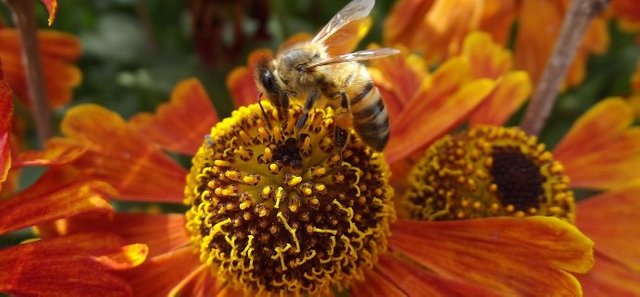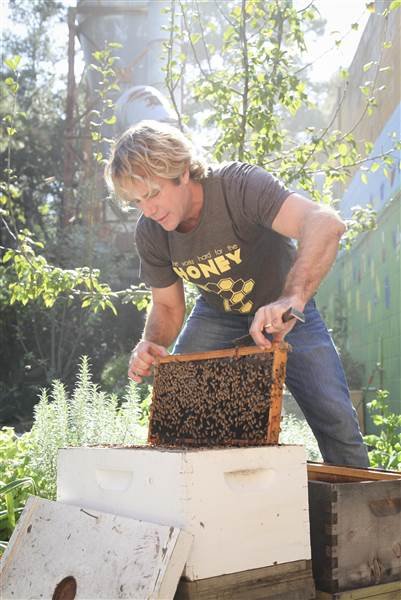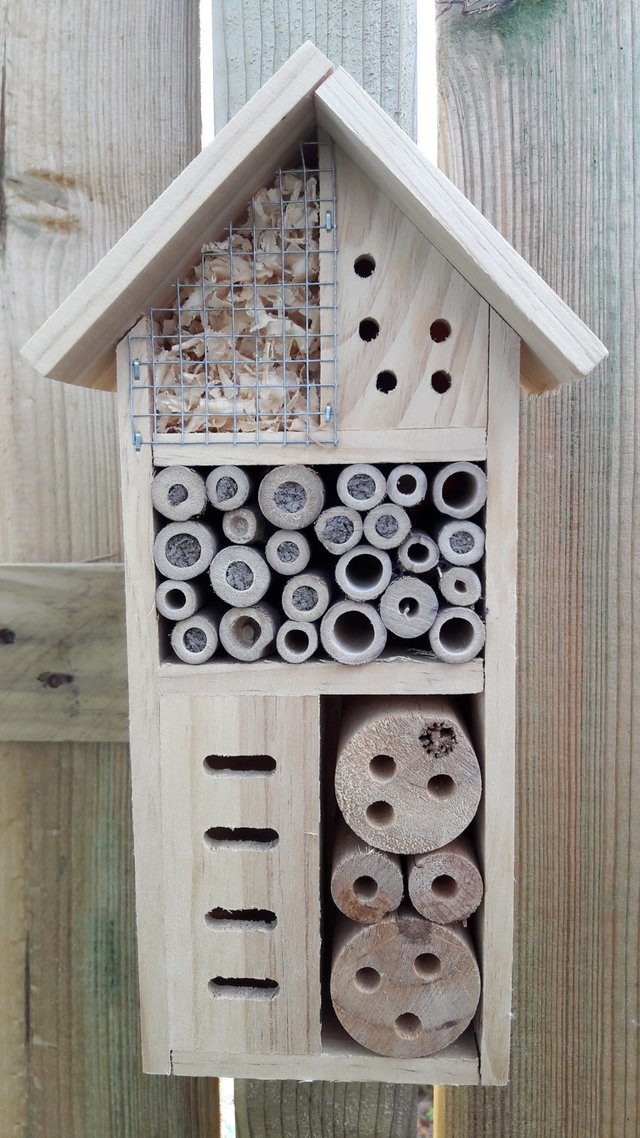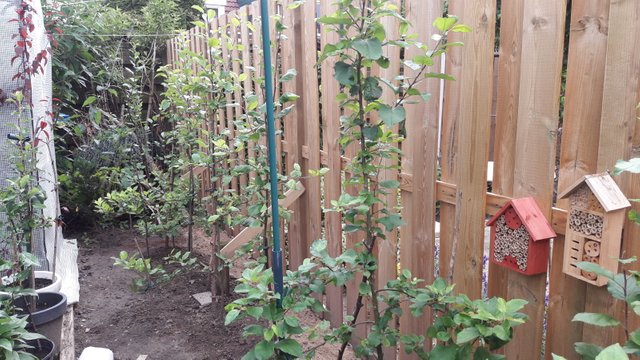The Weekly Bee
Every Monday, I'm going to do a round-up of the interesting bee items that I found over the past week. If you find any interesting bee news (or write a bee article), please send me a link and I'll include it and credit (and follow) you. My company, D161T4L W15D0M, will be attempting to start up a #bee/#bees community on Steemit shortly -- please let me know in the comments if you wish to be included (or, better yet, create a post deserving and using one of those tags).

If you're in the United States, hopefully you enjoyed National Honey Bee Day on Saturday (I'll try to warn you before the fact next time -- August 19, 2017)
How to Distinguish Real Honey from Fake One? Few Signs of Differences.
21 August 2016 - Good day amigos. Today i want to tell you about how to distinguish real #honey from fake.I'm sure every fan of honey interested in this. How to distinguish real honey? It's very easy. And now I'll tell you!

Q&A with Honey Bee Researcher Michelle Flenniken
19 August 2016 - On the eve of National Honey Bee Day, PLOS’s Jose Mendez interviews researcher Dr. Michelle Flenniken, Ph.D of Montana State University to discuss the role of viruses on honey bee health and the importance of honey bee colony losses in her new PLOS Pathogens Pearls Article, The Buzz About Honey Bee Viruses.

Beauty and the bees! How your makeup can help save honeybees
19 August 2016 - By now you've probably heard of the plight of honeybees — too many pesticides, not enough wildflowers and bee colonies across the world dying off at alarming and unprecedented rates. It makes sense that beauty brands, given how many of them rely on honey or beeswax in their potions and balms, have started to get involved. And the best part? Helping bees can now be as simple as buying a face cream. (But you should also support local beekeepers and maybe plant some flowers, too, if you want to make an even bigger impact.) In celebration of National Honeybee Day on Aug. 20, here are a few brands dedicated to the cause.

Flow Hive: Honey on Tap Directly From Your Beehive (& Awesome Bee T-Shirts)
19 August 2016 - As a traditional beekeeper, I find this very intriguing but I have my doubts that it's as easy as they say . . . . but their Indiegogo pitch page has got tons of bee pictures and bee videos and good bee advice (and ends August 22nd).
Neonicotinoids May Harm Wild Bees
16 August 2016 - Exposure to neonicotinoid pesticides is correlated with population declines of a large number of wild bee species, according to a field study conducted in the U.K.
Treatment of oilseed rape, a major flowering crop grown in England, with neonicotinoid pesticides is correlated with population declines of wild bees, according to a study published today (August 16) in Nature Communications, in which researchers examined links between the area of chemical-treated crops and populations of 62 wild bee species across parts of the U.K. for 18 years.
SIX SEXY HAIRY LEGS and I fell in LOVE!
Who would have thought it? Seven years have passed and what began as my opportunity to finally peek inside a box has become my passion. My solitude. Therapy in a sense. You’ve seen them. The boxes. Wooden boxes stacked to different heights, hiding in backyards or sometimes clustered on the edge of a field. Often disguised in white, these wooden structures are home to the most incredible life-giving creatures we have on the planet. The HONEYBEE. The beauty of these bugs never stops amazing me. Something so small but so incredibly important to each of our everyday lives.
Nation’s Beekeepers Lost 44 Percent of Bees in 2015-16
10 May 2016 - Summer losses rival winter losses for the second year running
Beekeepers across the United States lost 44 percent of their honey bee colonies during the year spanning April 2015 to April 2016, according to the latest preliminary results of an annual nationwide survey. Rates of both winter loss and summer loss—and consequently, total annual losses—worsened compared with last year. This marks the second consecutive survey year that summer loss rates rivaled winter loss rates.

Soil Association scientific briefing reveals new data on the impact of neonicotinoids on pollinators
28 April 2016 - New data revealed today shows bees can be exposed to more pesticides from contaminated wildflowers than from crops on farms. The research, discussed at a scientific briefing in London on 28 April 2016 organised by the Soil Association, showed a staggering 97% of the neonicotinoids brought back to honeybee hives in pollen could come from wildflowers - not oilseed rape. (1)

Thanks for keeping the Buzz going about bees , Some Sweet stories you have there. I hope you can stick around and wax lyrical about our essential insects.
Thank you! Are you a beekeeper? Like I said in my introduce yourself, it's the . . . best . . . hobby . . . ever (even before the honey and the mead ;-)
Oops! First commented with one of my corporate accounts. ;-)
No but I love Bees. I live in Australia we have lots of really cool Native bees plus the introduced European honey bees.
Nice! Are you a photographer? Have any good pictures of those native bees? It's really interesting to see how bees vary around the world (and the honey tastes really different as well in some places).
I agree about the taste of the Honey, every flower changes the flavour. We have very mild honey like the macadamia flower (yes the nut is native in my area) and really bold like the tea tree ( melaleuca )
You might bee interested in this site http://www.aussiebee.com.au/
Every flower changes the flavor but, in Asia, the honey is radically different -- both sweet and sour (figures ;-) ) and much thinner too. The same is true of South American honey -- very different.
Thanks for the link!
No bees, no food! Know bees, Know food!
Love bees & real honey! :)
This has a niche (but surprisingly growing!) audience, though the plight of bees is surely interesting. Bees are such fascinating creatures and the benefits that they provide are so underestimated. Thanks for keeping us informed. Looking forward to reading more of this!
Your posts about bees are so interesting! I follow you!:)
" It makes sense that beauty brands, given how many of them rely on honey or beeswax in their potions and balms, have started to get involved. And the best part? Helping bees can now be as simple as buying a face cream. (But you should also support local beekeepers and maybe plant some flowers, too, if you want to make an even bigger impact.) " Is so true! Both my organic facial cream and lotion have honey. Here in The Netherlands, Greenpeace promotes it to adopt bees for as low as 5 to 15 euro to support them for a year and you get to have a pack of flowers bees love and they support the beekeepers. Almost every house with a garden have a bee hotel as well. I do and I saw two wild bees alternately planting larvae and sealing the bamboo holes with mud before. I thought I'll hear them buzzing in July but they stayed sealed.

What could be wrong? I now have two of them hoping they'd be full next year.
There's more bees this year than last year but I wonder do you think the larvae on the brown bee hotel would actually hatch? Perhaps next year or should I start unclogging the holes?
Don't unclog the holes, be patient. I suspect the bees put some eggs into the tube then mud then more eggs and more mud. They bees will most likely emerge next spring when things warm up. I am not familiar with the brown bee, but Mason bees (which people will keep in those same type of tubes) here in the US emerge in spring and are active for only a short period (6-8 weeks). The tubes sit idle the rest of the time. Don't despair.
@jwaser, I see .. but wouldn't it be frozen in winter? the bees must have planted two larvae each hole i suppose. I watched them do it in Spring. They looked like honey bees but maybe you are right - they must be mason bees. Anyway, I'll let it be like that and perhaps cover it to keep it warm in winter
Thank you. I hope you fix your featured posts